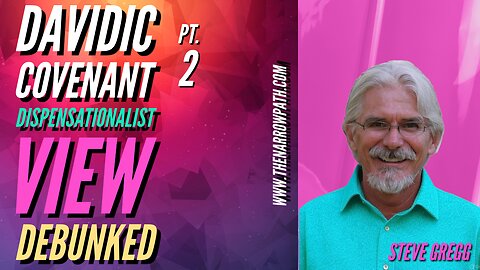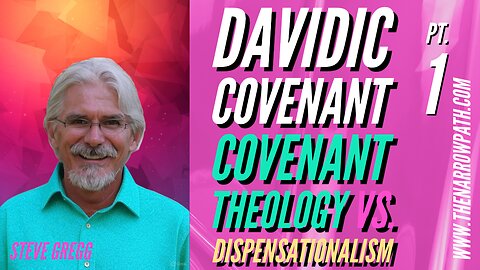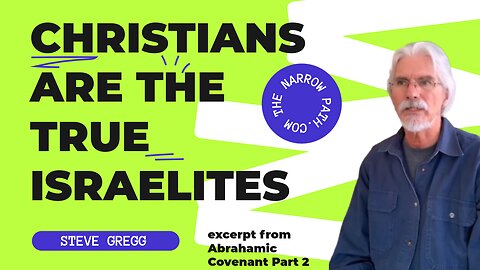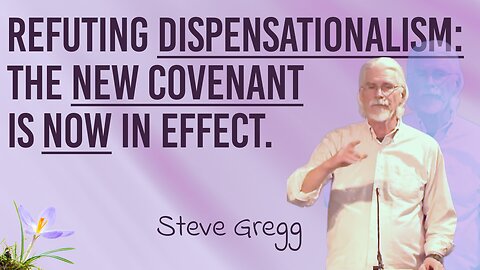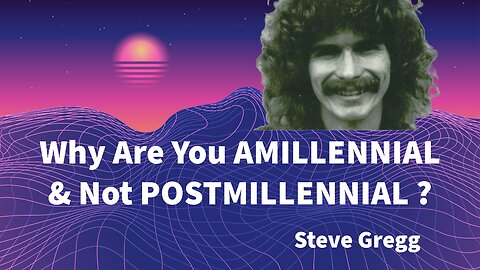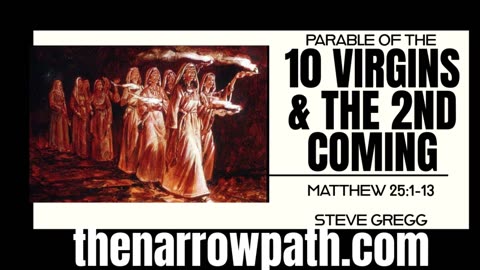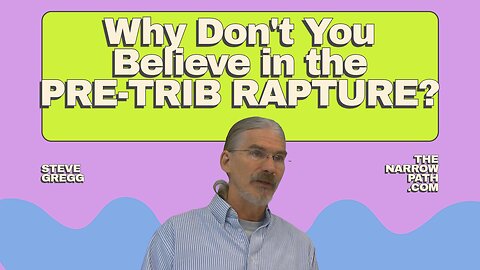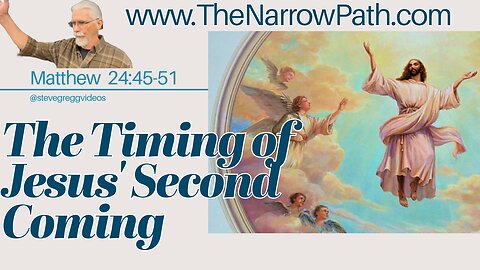
Prophecy - Eschatology - End Times - Steve Gregg
49 videos
Updated 4 months ago
Steve Gregg's lectures dealing with passages or topics that are normally regarding as referring to the end times, last days, rapture, great tribulation, second coming, end of the earth,
-
Abomination of Desolation: Caller Disagrees with Steve Gregg
 The Narrow PathWhat is your take on the "Abomination of Desolation?" [Matthew 24:15, 24:3, Mark 13:14 Luke 21:20, Daniel 9:27, Acts 1:11, Isaiah 19:1]. https://www.matthew713.com/questions/abomination-desolation-14 Date 2025-06-30 Call length 18:17 Bible references Matthew 24.15 Mark 13.14 Luke 21.20 Daniel 9.27 Matthew 24.3 Acts 1.11 Isaiah 19.1 Call-in at (844) 484-5737 to The Narrow Path daily radio program, which is hosted by Steve Gregg. Steve takes calls and answers bible questions and questions related to the Christian faith Weekdays from 2-3 pm PT/ 5-6 pm ET. Listen live at https://youtube.com/stevegreggvideos, https://thenarrowpath.app or https://thenarrowpath.com. Archived programs also available at all three locations. Topics Abomination Abomination of Desolation Figures of Speech Hebraisms (Hebrew Idioms) Idioms Destruction (Desolation) End of the Age Jesus "Coming" (in Judgment, on Clouds) 70 A.D. Second Coming (Return of Christ) Judgment Warn (ings, signs) #lastdays #endtimes #eschatology #abominationofdesolation #partialpreterism #preterism #dispensationalism #futurist #biblequestions #bibleanswers #thenarrowpath #stevegregg #bibleqa #livestream144 views 1 comment
The Narrow PathWhat is your take on the "Abomination of Desolation?" [Matthew 24:15, 24:3, Mark 13:14 Luke 21:20, Daniel 9:27, Acts 1:11, Isaiah 19:1]. https://www.matthew713.com/questions/abomination-desolation-14 Date 2025-06-30 Call length 18:17 Bible references Matthew 24.15 Mark 13.14 Luke 21.20 Daniel 9.27 Matthew 24.3 Acts 1.11 Isaiah 19.1 Call-in at (844) 484-5737 to The Narrow Path daily radio program, which is hosted by Steve Gregg. Steve takes calls and answers bible questions and questions related to the Christian faith Weekdays from 2-3 pm PT/ 5-6 pm ET. Listen live at https://youtube.com/stevegreggvideos, https://thenarrowpath.app or https://thenarrowpath.com. Archived programs also available at all three locations. Topics Abomination Abomination of Desolation Figures of Speech Hebraisms (Hebrew Idioms) Idioms Destruction (Desolation) End of the Age Jesus "Coming" (in Judgment, on Clouds) 70 A.D. Second Coming (Return of Christ) Judgment Warn (ings, signs) #lastdays #endtimes #eschatology #abominationofdesolation #partialpreterism #preterism #dispensationalism #futurist #biblequestions #bibleanswers #thenarrowpath #stevegregg #bibleqa #livestream144 views 1 comment -
Davidic Covenant Pt 2, Dispensationalist View Debunked - Steve Gregg
 The Narrow Pathhttps://thenarrowpath.com | In this portion of Steve Gregg's lecture on the Davidic Covenant, he critiques the dispensationalist view, which holds three main beliefs about its ultimate fulfillment: first, that Jesus Christ must be politically enthroned in Jerusalem, as David ruled from there, a plan dispensationalists like John Walvoord argue was thwarted by the crucifixion and thus awaits future fulfillment; second, that Jesus offered Israel a political kingdom, which they rejected, leading to its postponement until His second coming, a view supported by figures like John Nelson Darby and C.I. Scofield, who see the church age as a parenthetical period; and third, that Christ will fulfill the Davidic Covenant by reigning literally on David’s throne in Jerusalem during a future millennial kingdom. Gregg challenges these claims, arguing they lack biblical support, noting that the New Testament presents Jesus as already enthroned at God’s right hand, fulfilling the covenant through a spiritual kingdom, not a political one, as evidenced by Peter’s sermon in Acts 2 and Paul’s in Acts 13. He emphasizes that the kingdom is present, spiritual, and inclusive of the faithful remnant, not postponed, and critiques dispensationalism’s novel interpretation as a departure from historic Christian teaching. FULL SERIES - YOUTUBE: https://www.youtube.com/watch?v=Scz5t_D-ung&list=PLtzt3JhaK2U6eSPTq0d07GqFpJDclldyT OR MP3: https://thenarrowpath.com/topical_lectures.php?v01#What_are_We_to_Make_of_Israel Lecture Outline • Dispensationalist View on the Davidic Covenant – Requires a future, literal fulfillment with Christ reigning politically in Jerusalem. – Jesus offered a political kingdom, but Israel’s rejection led to its postponement until His second coming (John Walvoord, C.I. Scofield, Charles Ryrie, Dwight Pentecost). – Church age as a ”parenthesis” not prophesied in the Old Testament; the church is distinct from the kingdom. – The millennium (Revelation 20) as the fulfillment of the Davidic Covenant, with Jesus reigning on David’s literal throne. – Sermon on the Mount applies to the future millennial kingdom, not the church (Scofield’s view). • Critique of Dispensationalism – No scriptural evidence for a postponed kingdom; Jesus taught the kingdom was at hand (Mark 1:15). – H.A. Ironside admits the postponed kingdom idea was absent for 16–18 centuries until Darby. – Comparison to Joseph Smith’s claims of rediscovering lost truths, suggesting Darby’s view may not align with apostolic teaching. – Revelation 20 as the sole reference to a millennium, interpreted variably (premillennial, amillennial, postmillennial). • New Testament Fulfillment of the Davidic Covenant – Jesus’ kingdom is spiritual, not political (John 18:36, Luke 17:20–21). – Jesus rejected attempts to make Him a political king (John 6:15). – The remnant of Israel (true believers) entered the spiritual kingdom (John 8:37–44, Luke 12:32). – The kingdom was taken from apostate Israel and given to a nation producing its fruits (Matthew 21:43). – Gentiles also conveyed into Christ’s kingdom (Colossians 1:13). – Early church preached the gospel of the kingdom, not a postponed kingdom (Acts 2, Acts 13). – Peter and Paul affirm Jesus’ resurrection fulfilled the Davidic Covenant (Acts 2:29–36, Acts 13:28–34). – Jesus’ enthronement at God’s right hand as the fulfillment of sitting on David’s throne, not a literal chair in Jerusalem. • Implications for the Gospel – The gospel of the kingdom is the gospel of grace (Acts 20:24–25). – Dispensationalism’s separation of the gospel of the kingdom and the gospel of grace is unbiblical. – The church is the kingdom, with Christ as King, reigning now (Romans 14:17). – The message: Submit to Jesus as King, or face judgment (Matthew 24:14). • Conclusion – The Davidic Covenant is fulfilled in Christ’s spiritual kingdom, not a future political reign. – The church, as the true Israel, is central to God’s plan, not national Israel. – Dispensationalism’s focus on a future Jewish kingdom shifts the focus from Jesus to Israel, contrary to historic Christianity #bible #newtestament #newcovenant #covenanttheology #newcovenanttheology #davidiccovenant #dispensationalism #gospel #jesus #david #bibleanswers #thenarrowpath #stevegregg136 views
The Narrow Pathhttps://thenarrowpath.com | In this portion of Steve Gregg's lecture on the Davidic Covenant, he critiques the dispensationalist view, which holds three main beliefs about its ultimate fulfillment: first, that Jesus Christ must be politically enthroned in Jerusalem, as David ruled from there, a plan dispensationalists like John Walvoord argue was thwarted by the crucifixion and thus awaits future fulfillment; second, that Jesus offered Israel a political kingdom, which they rejected, leading to its postponement until His second coming, a view supported by figures like John Nelson Darby and C.I. Scofield, who see the church age as a parenthetical period; and third, that Christ will fulfill the Davidic Covenant by reigning literally on David’s throne in Jerusalem during a future millennial kingdom. Gregg challenges these claims, arguing they lack biblical support, noting that the New Testament presents Jesus as already enthroned at God’s right hand, fulfilling the covenant through a spiritual kingdom, not a political one, as evidenced by Peter’s sermon in Acts 2 and Paul’s in Acts 13. He emphasizes that the kingdom is present, spiritual, and inclusive of the faithful remnant, not postponed, and critiques dispensationalism’s novel interpretation as a departure from historic Christian teaching. FULL SERIES - YOUTUBE: https://www.youtube.com/watch?v=Scz5t_D-ung&list=PLtzt3JhaK2U6eSPTq0d07GqFpJDclldyT OR MP3: https://thenarrowpath.com/topical_lectures.php?v01#What_are_We_to_Make_of_Israel Lecture Outline • Dispensationalist View on the Davidic Covenant – Requires a future, literal fulfillment with Christ reigning politically in Jerusalem. – Jesus offered a political kingdom, but Israel’s rejection led to its postponement until His second coming (John Walvoord, C.I. Scofield, Charles Ryrie, Dwight Pentecost). – Church age as a ”parenthesis” not prophesied in the Old Testament; the church is distinct from the kingdom. – The millennium (Revelation 20) as the fulfillment of the Davidic Covenant, with Jesus reigning on David’s literal throne. – Sermon on the Mount applies to the future millennial kingdom, not the church (Scofield’s view). • Critique of Dispensationalism – No scriptural evidence for a postponed kingdom; Jesus taught the kingdom was at hand (Mark 1:15). – H.A. Ironside admits the postponed kingdom idea was absent for 16–18 centuries until Darby. – Comparison to Joseph Smith’s claims of rediscovering lost truths, suggesting Darby’s view may not align with apostolic teaching. – Revelation 20 as the sole reference to a millennium, interpreted variably (premillennial, amillennial, postmillennial). • New Testament Fulfillment of the Davidic Covenant – Jesus’ kingdom is spiritual, not political (John 18:36, Luke 17:20–21). – Jesus rejected attempts to make Him a political king (John 6:15). – The remnant of Israel (true believers) entered the spiritual kingdom (John 8:37–44, Luke 12:32). – The kingdom was taken from apostate Israel and given to a nation producing its fruits (Matthew 21:43). – Gentiles also conveyed into Christ’s kingdom (Colossians 1:13). – Early church preached the gospel of the kingdom, not a postponed kingdom (Acts 2, Acts 13). – Peter and Paul affirm Jesus’ resurrection fulfilled the Davidic Covenant (Acts 2:29–36, Acts 13:28–34). – Jesus’ enthronement at God’s right hand as the fulfillment of sitting on David’s throne, not a literal chair in Jerusalem. • Implications for the Gospel – The gospel of the kingdom is the gospel of grace (Acts 20:24–25). – Dispensationalism’s separation of the gospel of the kingdom and the gospel of grace is unbiblical. – The church is the kingdom, with Christ as King, reigning now (Romans 14:17). – The message: Submit to Jesus as King, or face judgment (Matthew 24:14). • Conclusion – The Davidic Covenant is fulfilled in Christ’s spiritual kingdom, not a future political reign. – The church, as the true Israel, is central to God’s plan, not national Israel. – Dispensationalism’s focus on a future Jewish kingdom shifts the focus from Jesus to Israel, contrary to historic Christianity #bible #newtestament #newcovenant #covenanttheology #newcovenanttheology #davidiccovenant #dispensationalism #gospel #jesus #david #bibleanswers #thenarrowpath #stevegregg136 views -
Davidic Covenant Pt 1, Covenant Theology vs Dispensationalism - Steve Gregg
 The Narrow Pathhttps://thenarrowpath.com | In Steve Gregg's lecture on the Davidic Covenant, part of his series "What Are We to Make of Israel," he contrasts the dispensationalist view—popularized in the 19th century by John Nelson Darby, which emphasizes the nation of Israel's key role in end-times prophecy—with the historic church teaching that identifies the true Israel as a spiritual entity comprising both believing Jews and Gentiles in Christ, often labeled "replacement theology" by dispensationalists. Gregg explores the Davidic Covenant from 2 Samuel 7, where God promises David an eternal dynasty, fulfilled initially through Solomon’s building of the temple and later kings, but ultimately through Jesus as the Messiah, who establishes a spiritual house (the church) and reigns eternally. He argues that while Solomon and other Davidic kings were types of Christ, Jesus, as the son of David and son of God, fulfills the covenant’s eternal promise through his resurrection and reign, challenging the dispensationalist focus on a literal national Israel. Additionally, Gregg focuses on the Covenant Theology view, emphasizing a unified covenantal framework where the Abrahamic, Sinaitic, and Davidic Covenants converge in Christ, portraying the church as the continuation and fulfillment of God’s covenantal promises to Israel. FULL SERIES - YOUTUBE: https://www.youtube.com/watch?v=Scz5t_D-ung&list=PLtzt3JhaK2U6eSPTq0d07GqFpJDclldyT OR MP3: https://thenarrowpath.com/topical_lectures.php?v01#What_are_We_to_Make_of_Israel Lecture Outline Dispensationalism Overview – Dominant perspective when discussing Israel, particularly in end-time prophecy. – Originated with John Nelson Darby in the 1830s; not taught by the church prior to the 19th century. – Some dispensationalists claim traces of their views in earlier writings, but the system as a whole began with Darby. – Emphasizes ethnic and national Israel as a key player in end-time prophecy. • Historical Church Perspective – For 18 centuries, the church taught that God called a believing remnant of Israel through Christ. – This remnant, consisting of Jews and Gentiles who believe in the Messiah, constitutes the ”true Israel” or the church. – Dispensationalists label this view ”replacement theology,” claiming it replaces Israel with the church, which they consider heretical. – Historical view: Jews and Gentiles who believe in Christ are the Israel of God (Galatians 6:16). – Paul’s teaching: Those with the faith of Abraham, regardless of ethnicity, are Abraham’s seed (Galatians 3). • Distinction Between Ethnic and National Israel – Ethnic Israel: Descendants of Abraham, Isaac, and Jacob, regardless of location. – National Israel: The political entity established in 1948, including nonJewish citizens (e.g., Arabs in the Knesset). – Dispensationalists often conflate ethnic and national Israel, assuming both are central to biblical prophecy. • Covenant Theology – Covenants define God’s relationship with His people, similar to a marriage covenant. – Abrahamic Covenant: Promises to Abraham’s seed, fulfilled in Christ (Galatians 3). – Sinaitic Covenant: Conditional covenant at Mount Sinai, requiring faithfulness; Israel’s unfaithfulness led to consequences. – Davidic Covenant: Focus of the lecture, detailed below. • The Davidic Covenant (2 Samuel 7:12–16) – God’s promise to David: * After David’s death, God would raise up his seed to establish a kingdom. * This seed would build a house for God’s name. * The throne of this kingdom would be established forever. * God would have a father-son relationship with David’s seed. * Discipline would occur for iniquity, but God’s mercy would remain with David’s house. – Appears unconditional, unlike the Sinaitic Covenant. – Initially applied to Solomon (built the temple), but ultimately fulfilled in Christ (Hebrews 1). – Solomon and David as types of Christ; Christ as the antitype, building a spiritual house (the church, 1 Peter 2:5, Ephesians 2). • Jewish Expectations of the Messiah – Jews expected a political Messiah to liberate them from Roman oppression, like David freed Israel from the Philistines. – Recognized the Davidic Covenant as messianic, expecting a son of David to reign forever (Matthew 12). – Jesus acknowledged as the son of David (messianic title) but also the Son of God (Romans 1:3–4). #bible #newtestament #newcovenant #covenanttheology #newcovenanttheology #davidiccovenant #dispensationalism #gospel #jesus #david #bibleanswers #thenarrowpath #stevegregg85 views
The Narrow Pathhttps://thenarrowpath.com | In Steve Gregg's lecture on the Davidic Covenant, part of his series "What Are We to Make of Israel," he contrasts the dispensationalist view—popularized in the 19th century by John Nelson Darby, which emphasizes the nation of Israel's key role in end-times prophecy—with the historic church teaching that identifies the true Israel as a spiritual entity comprising both believing Jews and Gentiles in Christ, often labeled "replacement theology" by dispensationalists. Gregg explores the Davidic Covenant from 2 Samuel 7, where God promises David an eternal dynasty, fulfilled initially through Solomon’s building of the temple and later kings, but ultimately through Jesus as the Messiah, who establishes a spiritual house (the church) and reigns eternally. He argues that while Solomon and other Davidic kings were types of Christ, Jesus, as the son of David and son of God, fulfills the covenant’s eternal promise through his resurrection and reign, challenging the dispensationalist focus on a literal national Israel. Additionally, Gregg focuses on the Covenant Theology view, emphasizing a unified covenantal framework where the Abrahamic, Sinaitic, and Davidic Covenants converge in Christ, portraying the church as the continuation and fulfillment of God’s covenantal promises to Israel. FULL SERIES - YOUTUBE: https://www.youtube.com/watch?v=Scz5t_D-ung&list=PLtzt3JhaK2U6eSPTq0d07GqFpJDclldyT OR MP3: https://thenarrowpath.com/topical_lectures.php?v01#What_are_We_to_Make_of_Israel Lecture Outline Dispensationalism Overview – Dominant perspective when discussing Israel, particularly in end-time prophecy. – Originated with John Nelson Darby in the 1830s; not taught by the church prior to the 19th century. – Some dispensationalists claim traces of their views in earlier writings, but the system as a whole began with Darby. – Emphasizes ethnic and national Israel as a key player in end-time prophecy. • Historical Church Perspective – For 18 centuries, the church taught that God called a believing remnant of Israel through Christ. – This remnant, consisting of Jews and Gentiles who believe in the Messiah, constitutes the ”true Israel” or the church. – Dispensationalists label this view ”replacement theology,” claiming it replaces Israel with the church, which they consider heretical. – Historical view: Jews and Gentiles who believe in Christ are the Israel of God (Galatians 6:16). – Paul’s teaching: Those with the faith of Abraham, regardless of ethnicity, are Abraham’s seed (Galatians 3). • Distinction Between Ethnic and National Israel – Ethnic Israel: Descendants of Abraham, Isaac, and Jacob, regardless of location. – National Israel: The political entity established in 1948, including nonJewish citizens (e.g., Arabs in the Knesset). – Dispensationalists often conflate ethnic and national Israel, assuming both are central to biblical prophecy. • Covenant Theology – Covenants define God’s relationship with His people, similar to a marriage covenant. – Abrahamic Covenant: Promises to Abraham’s seed, fulfilled in Christ (Galatians 3). – Sinaitic Covenant: Conditional covenant at Mount Sinai, requiring faithfulness; Israel’s unfaithfulness led to consequences. – Davidic Covenant: Focus of the lecture, detailed below. • The Davidic Covenant (2 Samuel 7:12–16) – God’s promise to David: * After David’s death, God would raise up his seed to establish a kingdom. * This seed would build a house for God’s name. * The throne of this kingdom would be established forever. * God would have a father-son relationship with David’s seed. * Discipline would occur for iniquity, but God’s mercy would remain with David’s house. – Appears unconditional, unlike the Sinaitic Covenant. – Initially applied to Solomon (built the temple), but ultimately fulfilled in Christ (Hebrews 1). – Solomon and David as types of Christ; Christ as the antitype, building a spiritual house (the church, 1 Peter 2:5, Ephesians 2). • Jewish Expectations of the Messiah – Jews expected a political Messiah to liberate them from Roman oppression, like David freed Israel from the Philistines. – Recognized the Davidic Covenant as messianic, expecting a son of David to reign forever (Matthew 12). – Jesus acknowledged as the son of David (messianic title) but also the Son of God (Romans 1:3–4). #bible #newtestament #newcovenant #covenanttheology #newcovenanttheology #davidiccovenant #dispensationalism #gospel #jesus #david #bibleanswers #thenarrowpath #stevegregg85 views -
Christians Are the True Israelites - Steve Gregg (excerpt from Abrahamic Covenant, Pt 2)
 The Narrow Pathhttps://thenarrowpath.com | Steve Gregg emphasizes Paul's teaching that disciples of Christ (Jew and Gentile) are the true circumcision, the true Israelites, who worship in spirit and in truth. We are Abraham's children because we have the faith of Abraham are in Christ, the true Israel. This is an excerpt from a teaching titled "The Abrahamic Covenant Part 2" in Steve's series "What Are We to Make of Israel?" (see https://www.youtube.com/watch?v=7MoPMaCND_s&list=PLtzt3JhaK2U6eSPTq0d07GqFpJDclldyT&index=4) Spiritual Significance of Circumcision • Physical circumcision is a type of heart circumcision (Deuteronomy 10:16, Jeremiah 4:4), emphasizing a spiritual state over physical ritual. • The heart, like private parts, is hidden, symbolizing the inner man; circumcision of the heart produces spiritual fruit, not physical offspring. • God’s focus is on eternal spiritual connection, not temporary physical acts, which pass away. New Testament Perspective on Circumcision • Paul, in Romans 2:26–29, argues that Gentiles living righteously are counted as circumcised, while unrighteous Jews, though physically circumcised, are not. • Colossians 2:11 describes Christians as circumcised “not made with hands” through Christ’s work, emphasizing heart circumcision. • In Galatians 5:6, neither circumcision nor uncircumcision matters; faith working through love defines covenant inclusion. • Philippians 3:3 identifies Christians (Jew and Gentile) as the true circumcision, worshipping in spirit and trusting in Christ, not flesh (Galatians 6:16). Defining Abraham’s Children • Biological descent from Abraham is irrelevant; spiritual likeness to Abraham’s faith defines his children (John 8:37–44, Galatians 3:7–9). • John the Baptist dismisses ancestry claims, stating God can raise children from stones (Matthew 3:9). • God’s promise to Abraham (Genesis 18:17–19) requires his descendants to live righteously to inherit blessings. #bible #newcovenant #christian #disciples #replacementtheology #dispensationalism #israel #israelofgod #israelisthechurch #thenarrowpath #stevegregg #bibleteaching #biblestudy #abraham87 views
The Narrow Pathhttps://thenarrowpath.com | Steve Gregg emphasizes Paul's teaching that disciples of Christ (Jew and Gentile) are the true circumcision, the true Israelites, who worship in spirit and in truth. We are Abraham's children because we have the faith of Abraham are in Christ, the true Israel. This is an excerpt from a teaching titled "The Abrahamic Covenant Part 2" in Steve's series "What Are We to Make of Israel?" (see https://www.youtube.com/watch?v=7MoPMaCND_s&list=PLtzt3JhaK2U6eSPTq0d07GqFpJDclldyT&index=4) Spiritual Significance of Circumcision • Physical circumcision is a type of heart circumcision (Deuteronomy 10:16, Jeremiah 4:4), emphasizing a spiritual state over physical ritual. • The heart, like private parts, is hidden, symbolizing the inner man; circumcision of the heart produces spiritual fruit, not physical offspring. • God’s focus is on eternal spiritual connection, not temporary physical acts, which pass away. New Testament Perspective on Circumcision • Paul, in Romans 2:26–29, argues that Gentiles living righteously are counted as circumcised, while unrighteous Jews, though physically circumcised, are not. • Colossians 2:11 describes Christians as circumcised “not made with hands” through Christ’s work, emphasizing heart circumcision. • In Galatians 5:6, neither circumcision nor uncircumcision matters; faith working through love defines covenant inclusion. • Philippians 3:3 identifies Christians (Jew and Gentile) as the true circumcision, worshipping in spirit and trusting in Christ, not flesh (Galatians 6:16). Defining Abraham’s Children • Biological descent from Abraham is irrelevant; spiritual likeness to Abraham’s faith defines his children (John 8:37–44, Galatians 3:7–9). • John the Baptist dismisses ancestry claims, stating God can raise children from stones (Matthew 3:9). • God’s promise to Abraham (Genesis 18:17–19) requires his descendants to live righteously to inherit blessings. #bible #newcovenant #christian #disciples #replacementtheology #dispensationalism #israel #israelofgod #israelisthechurch #thenarrowpath #stevegregg #bibleteaching #biblestudy #abraham87 views -
Refuting Dispensationalism: The New Covenant is Now in Effect - Steve Gregg
 The Narrow Pathhttps://thenarrowpath.com | In this lecture, Steve Gregg explores the concept of the New Covenant as outlined in Jeremiah 31:31-34, emphasizing its relevance to Christians and its fulfillment in Jesus Christ. He argues that the New Covenant, established through Jesus’ blood, replaces the old Sinaitic covenant and is not a separate covenant for Israel and the church, as some dispensationalists propose. Gregg critiques dispensationalist views that suggest two new covenants or a future covenant for Israel, asserting that the New Testament clearly applies the New Covenant to the church, with Jesus’ actions at the Last Supper and the apostles’ teachings confirming its present reality for all believers, not a future event exclusive to Israel. Gregg further supports his interpretation by referencing New Testament passages, such as Hebrews and 2 Corinthians, which indicate the New Covenant is currently in effect, with God’s law written on believers’ hearts. He challenges the dispensationalist expectation of a literal, future regathering of Israel, suggesting that Old Testament prophecies, like those in Ezekiel 37 and Isaiah 43, find spiritual fulfillment in Christ and the church, encompassing both Jews and Gentiles. By emphasizing the New Testament’s spiritual interpretation of these promises, Gregg concludes that the New Covenant represents a universal inheritance in Christ, extending beyond a physical land to the entire world, with Jesus as the ultimate fulfillment of God’s promises to Abraham’s seed. Lecture Outline 1. Introduction to the New Covenant • The New Covenant is the last covenant God made with Israel, relevant to all Christians. • Reference to Jeremiah 31:31-34, which describes a new covenant with the house of Israel and Judah, distinct from the Sinaitic covenant. • Key features: God’s law written on hearts, universal knowledge of God, forgiveness of sins. 2. Contrast with the Old Covenant • The New Covenant replaces the Sinaitic covenant, which Israel broke (Hebrews 8:13). • Analogized to marriage: only one covenant at a time, the old covenant is obsolete. 3. Dispensationalist Views on the New Covenant • Two Covenants Theory: Some dispensationalists (e.g., Lewis Perry Schaeffer, John Walvoord, Charles Ryrie) argue for two new covenants, one for the church now and another for Israel in the future. • Future Covenant Only: John Darby posits a single future covenant for Israel, with the church enjoying its benefits spiritually but not formally. • Progressive Dispensationalism: Suggests partial fulfillment in the church now, with complete fulfillment for Israel later. • Critique: No biblical evidence for two covenants or partial fulfillment; these views stem from a need to fit prophecies into an end-times framework. 4. Biblical Evidence for the New Covenants' Present Fulfillment • Jesus established the New Covenant at the Last Supper (Luke 22:20), mirroring Moses' covenant initiation (Exodus 24). • Hebrews 8 and 10 quote Jeremiah 31 extensively, applying it to the present church age. 1 • 2 Corinthians 3:2-3 confirms the New Covenant's effect, with God's law written on believers' hearts. 5. The Faithful Remnant and the New Covenant • The New Covenant was made with the faithful remnant of Israel, represented by the apostles at the Last Supper. • The church, initially Jewish, is the New Covenant Israel, later including Gentiles (Romans 11). 6. Old Testament Prophecies and Spiritual Fulfillment • Jeremiah 3:14-16: God promises to bring a remnant to Zion, with no need for the ark of the old covenant, indicating a spiritual shift. • Ezekiel 37:21-29: Describes a restoration with one king (the Messiah, Jesus) and an everlasting covenant of peace, fulfilled in the church. • Hebrews 13:20 links the everlasting covenant to the present church age. 7. Interpreting Old Testament Prophecies • Historic Christianity uses the New Testament to interpret the Old Testament, seeing spiritual fulfillments in Christ. • Dispensationalists prioritize a literal interpretation of the Old Testament, leading to expectations of future physical fulfillment. • 1 Peter 1:10-12: Old Testament prophets spoke of the church's salvation, not fully understanding their prophecies. 8. Fulfillment of the Abrahamic Promise • Paul (Romans 4:13) interprets Abraham's promise as inheriting the world, not just a strip of land. • Psalm 2:8 and Matthew 5:5 extend the inheritance to the nations and the earth, fulfilled in Christ and believers (Galatians 3:28-29). 9. Gathering of God's People • Isaiah 43:5-6 and John 11:51-52: The gathering of Gods children includes Gentiles, not just Jews, were fulfilled through Jesus' death. • Luke 13:28-29 and Matthew 8:11: Gentiles join Abraham in the kingdom, while some Jews are excluded. #newtestament #newcovenant #dispensationalism #newcovenanttheology #jesus #bible #thenarrowpath #stevegregg #church #israel #bodyofchrist #christian #theology #falseteaching286 views 2 comments
The Narrow Pathhttps://thenarrowpath.com | In this lecture, Steve Gregg explores the concept of the New Covenant as outlined in Jeremiah 31:31-34, emphasizing its relevance to Christians and its fulfillment in Jesus Christ. He argues that the New Covenant, established through Jesus’ blood, replaces the old Sinaitic covenant and is not a separate covenant for Israel and the church, as some dispensationalists propose. Gregg critiques dispensationalist views that suggest two new covenants or a future covenant for Israel, asserting that the New Testament clearly applies the New Covenant to the church, with Jesus’ actions at the Last Supper and the apostles’ teachings confirming its present reality for all believers, not a future event exclusive to Israel. Gregg further supports his interpretation by referencing New Testament passages, such as Hebrews and 2 Corinthians, which indicate the New Covenant is currently in effect, with God’s law written on believers’ hearts. He challenges the dispensationalist expectation of a literal, future regathering of Israel, suggesting that Old Testament prophecies, like those in Ezekiel 37 and Isaiah 43, find spiritual fulfillment in Christ and the church, encompassing both Jews and Gentiles. By emphasizing the New Testament’s spiritual interpretation of these promises, Gregg concludes that the New Covenant represents a universal inheritance in Christ, extending beyond a physical land to the entire world, with Jesus as the ultimate fulfillment of God’s promises to Abraham’s seed. Lecture Outline 1. Introduction to the New Covenant • The New Covenant is the last covenant God made with Israel, relevant to all Christians. • Reference to Jeremiah 31:31-34, which describes a new covenant with the house of Israel and Judah, distinct from the Sinaitic covenant. • Key features: God’s law written on hearts, universal knowledge of God, forgiveness of sins. 2. Contrast with the Old Covenant • The New Covenant replaces the Sinaitic covenant, which Israel broke (Hebrews 8:13). • Analogized to marriage: only one covenant at a time, the old covenant is obsolete. 3. Dispensationalist Views on the New Covenant • Two Covenants Theory: Some dispensationalists (e.g., Lewis Perry Schaeffer, John Walvoord, Charles Ryrie) argue for two new covenants, one for the church now and another for Israel in the future. • Future Covenant Only: John Darby posits a single future covenant for Israel, with the church enjoying its benefits spiritually but not formally. • Progressive Dispensationalism: Suggests partial fulfillment in the church now, with complete fulfillment for Israel later. • Critique: No biblical evidence for two covenants or partial fulfillment; these views stem from a need to fit prophecies into an end-times framework. 4. Biblical Evidence for the New Covenants' Present Fulfillment • Jesus established the New Covenant at the Last Supper (Luke 22:20), mirroring Moses' covenant initiation (Exodus 24). • Hebrews 8 and 10 quote Jeremiah 31 extensively, applying it to the present church age. 1 • 2 Corinthians 3:2-3 confirms the New Covenant's effect, with God's law written on believers' hearts. 5. The Faithful Remnant and the New Covenant • The New Covenant was made with the faithful remnant of Israel, represented by the apostles at the Last Supper. • The church, initially Jewish, is the New Covenant Israel, later including Gentiles (Romans 11). 6. Old Testament Prophecies and Spiritual Fulfillment • Jeremiah 3:14-16: God promises to bring a remnant to Zion, with no need for the ark of the old covenant, indicating a spiritual shift. • Ezekiel 37:21-29: Describes a restoration with one king (the Messiah, Jesus) and an everlasting covenant of peace, fulfilled in the church. • Hebrews 13:20 links the everlasting covenant to the present church age. 7. Interpreting Old Testament Prophecies • Historic Christianity uses the New Testament to interpret the Old Testament, seeing spiritual fulfillments in Christ. • Dispensationalists prioritize a literal interpretation of the Old Testament, leading to expectations of future physical fulfillment. • 1 Peter 1:10-12: Old Testament prophets spoke of the church's salvation, not fully understanding their prophecies. 8. Fulfillment of the Abrahamic Promise • Paul (Romans 4:13) interprets Abraham's promise as inheriting the world, not just a strip of land. • Psalm 2:8 and Matthew 5:5 extend the inheritance to the nations and the earth, fulfilled in Christ and believers (Galatians 3:28-29). 9. Gathering of God's People • Isaiah 43:5-6 and John 11:51-52: The gathering of Gods children includes Gentiles, not just Jews, were fulfilled through Jesus' death. • Luke 13:28-29 and Matthew 8:11: Gentiles join Abraham in the kingdom, while some Jews are excluded. #newtestament #newcovenant #dispensationalism #newcovenanttheology #jesus #bible #thenarrowpath #stevegregg #church #israel #bodyofchrist #christian #theology #falseteaching286 views 2 comments -
Why Are You AMILLENNIAL & Not POSTMILLENNIAL? Steve Gregg Answers
 The Narrow Pathhttps://matthew713.com | Amillennialism vs Postmillennialism Question details What verses keep you from being a full post-millennialist? [Revelation 20:3]. Date 2022-05-09 Call length 11: Topics References Post vs Amillennialism Question details Could you help me understand why you favor Amillennialism, in contrast to Post-Millennialism? [Revelation 20:9]. Date 2024-02-23 Call length 3:07 #eschatology #postmillennialism #prophecy #amillennial #partialpreterism #preterism #endtimes #lastdays #stevegregg #thenarrowpath #biblequestions #bibleanswers #bible #bibleqa #qanda56 views
The Narrow Pathhttps://matthew713.com | Amillennialism vs Postmillennialism Question details What verses keep you from being a full post-millennialist? [Revelation 20:3]. Date 2022-05-09 Call length 11: Topics References Post vs Amillennialism Question details Could you help me understand why you favor Amillennialism, in contrast to Post-Millennialism? [Revelation 20:9]. Date 2024-02-23 Call length 3:07 #eschatology #postmillennialism #prophecy #amillennial #partialpreterism #preterism #endtimes #lastdays #stevegregg #thenarrowpath #biblequestions #bibleanswers #bible #bibleqa #qanda56 views -
Do the New Heavens & New Earth Refer to the Destruction of the Temple System? - Steve Gregg
 The Narrow Path"Global" vs "Local" Judgments & Temple System Destruction Question details Are the references to "heavens and earth" in 2 Peter 3, referring to the destruction of the temple system?. [2 Peter 3:5-6, Acts 3:19-20, Luke 22:20, Genesis 1]. Date: 2025-05-28 Call length: 12:29 Topics: Destruction (Desolation) Postmillennial (ism) 70 A.D., Exegesis & Eisegesis, Old Covenant, Full Preterism, Heavens and Earth (phrase), Temple New Jerusalem & the New Earth Question details How do I understand these three places: The New Heaven, The New Jerusalem, and the New Earth? [Revelation 19-22, Revelation 21:24, Matthew 12:49-50, Matthew 10:42, Revelation 7, 14, Hebrews 12:22-23]. Date: 2025-05-28 Call length: 7:29 Topics: Heaven (s), New Earth, New Jerusalem, 144,000 CALLS pulled from https://www.matthew713.com/shows/2025/05. Call-in at (844) 484-5737 to The Narrow Path daily radio program, which is hosted by Steve Gregg. Steve takes calls and answers bible questions and questions related to the Christian faith Weekdays from 2-3 pm PT/ 5-6 pm ET. Listen live at https://youtube.com/stevegreggvideos, https://thenarrowpath.app or https://thenarrowpath.com. Archived programs also available at all three locations. #fullpreterism #newheavennewearth #preterism #postmillennialism #revelation #2peter #newjerusalem #eschatology #70ad #temple #endtimes #lastdays #jerusalem #biblequestions #bibleanswers #thenarrowpath #stevegregg #bibleqa75 views 1 comment
The Narrow Path"Global" vs "Local" Judgments & Temple System Destruction Question details Are the references to "heavens and earth" in 2 Peter 3, referring to the destruction of the temple system?. [2 Peter 3:5-6, Acts 3:19-20, Luke 22:20, Genesis 1]. Date: 2025-05-28 Call length: 12:29 Topics: Destruction (Desolation) Postmillennial (ism) 70 A.D., Exegesis & Eisegesis, Old Covenant, Full Preterism, Heavens and Earth (phrase), Temple New Jerusalem & the New Earth Question details How do I understand these three places: The New Heaven, The New Jerusalem, and the New Earth? [Revelation 19-22, Revelation 21:24, Matthew 12:49-50, Matthew 10:42, Revelation 7, 14, Hebrews 12:22-23]. Date: 2025-05-28 Call length: 7:29 Topics: Heaven (s), New Earth, New Jerusalem, 144,000 CALLS pulled from https://www.matthew713.com/shows/2025/05. Call-in at (844) 484-5737 to The Narrow Path daily radio program, which is hosted by Steve Gregg. Steve takes calls and answers bible questions and questions related to the Christian faith Weekdays from 2-3 pm PT/ 5-6 pm ET. Listen live at https://youtube.com/stevegreggvideos, https://thenarrowpath.app or https://thenarrowpath.com. Archived programs also available at all three locations. #fullpreterism #newheavennewearth #preterism #postmillennialism #revelation #2peter #newjerusalem #eschatology #70ad #temple #endtimes #lastdays #jerusalem #biblequestions #bibleanswers #thenarrowpath #stevegregg #bibleqa75 views 1 comment -
The 10 Virgins & The Second Coming of Jesus Christ (Matthew 25:1-13) - Steve Gregg
 The Narrow Pathhttps://thenarrowpath.com | Steve Gregg explains the parable of the ten virgins in Matthew 25 and its relevance to Jewish wedding customs. He points out that the wise and foolish virgins represent those who are prepared and unprepared for the arrival of the bridegroom, likened to the return of Christ. He emphasizes that being a part of the church does not guarantee readiness for His return, and that believers must faithfully follow Christ and be ready at all times. Finally, he warns against the danger of being unfaithful like the wicked servant and facing the same fate of being cut off and cast away. | Transcript: https://opentheo.org/i/765611936653040098/matthew-251-2513 Matthew 25:1-13 New King James Version The Parable of the Wise and Foolish Virgins 25 “Then the kingdom of heaven shall be likened to ten virgins who took their lamps and went out to meet the bridegroom. 2 Now five of them were wise, and five were foolish. 3 Those who were foolish took their lamps and took no oil with them, 4 but the wise took oil in their vessels with their lamps. 5 But while the bridegroom was delayed, they all slumbered and slept. 6 “And at midnight a cry was heard: ‘Behold, the bridegroom [a]is coming; go out to meet him!’ 7 Then all those virgins arose and trimmed their lamps. 8 And the foolish said to the wise, ‘Give us some of your oil, for our lamps are going out.’ 9 But the wise answered, saying, ‘No, lest there should not be enough for us and you; but go rather to those who sell, and buy for yourselves.’ 10 And while they went to buy, the bridegroom came, and those who were ready went in with him to the wedding; and the door was shut. 11 “Afterward the other virgins came also, saying, ‘Lord, Lord, open to us!’ 12 But he answered and said, ‘Assuredly, I say to you, I do not know you.’ 13 “Watch therefore, for you know neither the day nor the hour [b]in which the Son of Man is coming. Footnotes Matthew 25:6 NU omits is coming Matthew 25:13 NU omits the rest of v. 13. Matthew 25:1-13 Legacy Standard Bible Parable of Ten Virgins 25 “Then the kingdom of heaven may be compared to ten virgins, who took their lamps and went out to meet the bridegroom. 2 Now five of them were foolish, and five were prudent. 3 For when the foolish took their lamps, they took no oil with them, 4 but the prudent took oil in flasks along with their lamps. 5 Now while the bridegroom was delaying, they all got drowsy and began to sleep. 6 But at midnight there was a shout, ‘Behold, the bridegroom! Come out to meet him.’ 7 Then all those virgins rose and trimmed their lamps. 8 And the foolish said to the prudent, ‘Give us some of your oil, for our lamps are going out.’ 9 But the prudent answered, saying, ‘No, there will not be enough for us and you too; go instead to the dealers and buy some for yourselves.’ 10 And while they were going away to make the purchase, the bridegroom came, and those who were ready went in with him to the wedding feast; and the door was shut. 11 And later the other virgins also *came, saying, ‘Lord, lord, open up for us.’ 12 But he answered and said, ‘Truly I say to you, I do not know you.’ 13 Therefore, stay awake, for you do not know the day nor the hour. #secondcoming #jesus #prophecy #parables #parableofjesus #parableoftenvirgins #virgin #dispensationalism #bible #israel #gospel #sonofman #matthew25 #olivetdiscourse #partialpreterism #preterism #endtimes #eschatology #lastdays #70ad #ad70 #newheavennewearth #thenarrowpath #stevegregg111 views 1 comment
The Narrow Pathhttps://thenarrowpath.com | Steve Gregg explains the parable of the ten virgins in Matthew 25 and its relevance to Jewish wedding customs. He points out that the wise and foolish virgins represent those who are prepared and unprepared for the arrival of the bridegroom, likened to the return of Christ. He emphasizes that being a part of the church does not guarantee readiness for His return, and that believers must faithfully follow Christ and be ready at all times. Finally, he warns against the danger of being unfaithful like the wicked servant and facing the same fate of being cut off and cast away. | Transcript: https://opentheo.org/i/765611936653040098/matthew-251-2513 Matthew 25:1-13 New King James Version The Parable of the Wise and Foolish Virgins 25 “Then the kingdom of heaven shall be likened to ten virgins who took their lamps and went out to meet the bridegroom. 2 Now five of them were wise, and five were foolish. 3 Those who were foolish took their lamps and took no oil with them, 4 but the wise took oil in their vessels with their lamps. 5 But while the bridegroom was delayed, they all slumbered and slept. 6 “And at midnight a cry was heard: ‘Behold, the bridegroom [a]is coming; go out to meet him!’ 7 Then all those virgins arose and trimmed their lamps. 8 And the foolish said to the wise, ‘Give us some of your oil, for our lamps are going out.’ 9 But the wise answered, saying, ‘No, lest there should not be enough for us and you; but go rather to those who sell, and buy for yourselves.’ 10 And while they went to buy, the bridegroom came, and those who were ready went in with him to the wedding; and the door was shut. 11 “Afterward the other virgins came also, saying, ‘Lord, Lord, open to us!’ 12 But he answered and said, ‘Assuredly, I say to you, I do not know you.’ 13 “Watch therefore, for you know neither the day nor the hour [b]in which the Son of Man is coming. Footnotes Matthew 25:6 NU omits is coming Matthew 25:13 NU omits the rest of v. 13. Matthew 25:1-13 Legacy Standard Bible Parable of Ten Virgins 25 “Then the kingdom of heaven may be compared to ten virgins, who took their lamps and went out to meet the bridegroom. 2 Now five of them were foolish, and five were prudent. 3 For when the foolish took their lamps, they took no oil with them, 4 but the prudent took oil in flasks along with their lamps. 5 Now while the bridegroom was delaying, they all got drowsy and began to sleep. 6 But at midnight there was a shout, ‘Behold, the bridegroom! Come out to meet him.’ 7 Then all those virgins rose and trimmed their lamps. 8 And the foolish said to the prudent, ‘Give us some of your oil, for our lamps are going out.’ 9 But the prudent answered, saying, ‘No, there will not be enough for us and you too; go instead to the dealers and buy some for yourselves.’ 10 And while they were going away to make the purchase, the bridegroom came, and those who were ready went in with him to the wedding feast; and the door was shut. 11 And later the other virgins also *came, saying, ‘Lord, lord, open up for us.’ 12 But he answered and said, ‘Truly I say to you, I do not know you.’ 13 Therefore, stay awake, for you do not know the day nor the hour. #secondcoming #jesus #prophecy #parables #parableofjesus #parableoftenvirgins #virgin #dispensationalism #bible #israel #gospel #sonofman #matthew25 #olivetdiscourse #partialpreterism #preterism #endtimes #eschatology #lastdays #70ad #ad70 #newheavennewearth #thenarrowpath #stevegregg111 views 1 comment -
Why Don't You Believe in the Pre-Trib Rapture? The Narrow Path with Steve Gregg 5.30.25
 The Narrow PathPre-trib Rapture Disagreement: What makes you not believe in the pre-trib rapture? [2 Thessalonians 2:3, 6, Luke 21:36, 32, 20, John 6:39, 40, 44, 54, 1 Thessalonians 5:9, 4:16-18, Ephesians 2:15, 19-22, 1 Corinthains 3:16, 2 Corinthians 6:16, 1 Peter 2:5]. May 30, 2025, Call #2 https://www.matthew713.com/questions/pre-trib-rapture-disagreement Call-in at (844) 484-5737 to The Narrow Path daily radio program, which is hosted by Steve Gregg. Steve takes calls and answers bible questions and questions related to the Christian faith Weekdays from 2-3 pm PT/ 5-6 pm ET. Listen live at https://youtube.com/stevegreggvideos, https://thenarrowpath.app or https://thenarrowpath.com. Archived programs also available at all three locations. #bible #rapture #pretrib #endtimes #lastdays #eschatology #dispensationalism #preterism #partialpreterism #tribulation #amillennial #calvarychapel #stevegregg #thenarrowpath #bibleteaching #biblestudy136 views 1 comment
The Narrow PathPre-trib Rapture Disagreement: What makes you not believe in the pre-trib rapture? [2 Thessalonians 2:3, 6, Luke 21:36, 32, 20, John 6:39, 40, 44, 54, 1 Thessalonians 5:9, 4:16-18, Ephesians 2:15, 19-22, 1 Corinthains 3:16, 2 Corinthians 6:16, 1 Peter 2:5]. May 30, 2025, Call #2 https://www.matthew713.com/questions/pre-trib-rapture-disagreement Call-in at (844) 484-5737 to The Narrow Path daily radio program, which is hosted by Steve Gregg. Steve takes calls and answers bible questions and questions related to the Christian faith Weekdays from 2-3 pm PT/ 5-6 pm ET. Listen live at https://youtube.com/stevegreggvideos, https://thenarrowpath.app or https://thenarrowpath.com. Archived programs also available at all three locations. #bible #rapture #pretrib #endtimes #lastdays #eschatology #dispensationalism #preterism #partialpreterism #tribulation #amillennial #calvarychapel #stevegregg #thenarrowpath #bibleteaching #biblestudy136 views 1 comment -
Timing of Jesus' Second Coming (Matthew 24:45-51) - Steve Gregg
 The Narrow Pathhttps://thenarrowpath.com | In this message, Steve Gregg discusses the last few verses of Matthew 24, where Jesus speaks about his Second Coming. Jesus uses the illustration of a thief in the night to emphasize the importance of being ready and faithful. He warns that no one knows when the Second Coming will occur, so it is important to always be prepared by living a life of faith and obedience to God. Gregg encourages listeners to focus on their daily relationship with God rather than obsessing over signs of the end times. He also highlights the importance of being faithful in our responsibilities and privileges, as we will be held accountable upon Jesus' return. | Transcript: https://opentheo.org/i/765611936653040097/matthew-2445-2451 Matthew 24:45-51 New King James Version The Faithful Servant and the Evil Servant 45 “Who then is a faithful and wise servant, whom his master made ruler over his household, to give them food [a]in due season? 46 Blessed is that servant whom his master, when he comes, will find so doing. 47 Assuredly, I say to you that he will make him ruler over all his goods. 48 But if that evil servant says in his heart, ‘My master is delaying [b]his coming,’ 49 and begins to beat his fellow servants, and to eat and drink with the drunkards, 50 the master of that servant will come on a day when he is not looking for him and at an hour that he is not aware of, 51 and will cut him in two and appoint him his portion with the hypocrites. There shall be weeping and gnashing of teeth. Footnotes Matthew 24:45 at the right time Matthew 24:48 NU omits his coming Matthew 24:45-51 English Standard Version 45 “Who then is the faithful and wise servant,[a] whom his master has set over his household, to give them their food at the proper time? 46 Blessed is that servant whom his master will find so doing when he comes. 47 Truly, I say to you, he will set him over all his possessions. 48 But if that wicked servant says to himself, ‘My master is delayed,’ 49 and begins to beat his fellow servants[b] and eats and drinks with drunkards, 50 the master of that servant will come on a day when he does not expect him and at an hour he does not know 51 and will cut him in pieces and put him with the hypocrites. In that place there will be weeping and gnashing of teeth. Footnotes Matthew 24:45 Or bondservant; also verses 46, 48, 50 Matthew 24:49 Or bondservants #secondcoming #jesus #prophecy #falseteaching #dispensationalism #bible #israel #gospel #sonofman #matthew24 #olivetdiscourse #partialpreterism #preterism #endtimes #eschatology #lastdays #70ad #ad70 #jerusalem #newheavennewearth #thenarrowpath #stevegregg69 views 2 comments
The Narrow Pathhttps://thenarrowpath.com | In this message, Steve Gregg discusses the last few verses of Matthew 24, where Jesus speaks about his Second Coming. Jesus uses the illustration of a thief in the night to emphasize the importance of being ready and faithful. He warns that no one knows when the Second Coming will occur, so it is important to always be prepared by living a life of faith and obedience to God. Gregg encourages listeners to focus on their daily relationship with God rather than obsessing over signs of the end times. He also highlights the importance of being faithful in our responsibilities and privileges, as we will be held accountable upon Jesus' return. | Transcript: https://opentheo.org/i/765611936653040097/matthew-2445-2451 Matthew 24:45-51 New King James Version The Faithful Servant and the Evil Servant 45 “Who then is a faithful and wise servant, whom his master made ruler over his household, to give them food [a]in due season? 46 Blessed is that servant whom his master, when he comes, will find so doing. 47 Assuredly, I say to you that he will make him ruler over all his goods. 48 But if that evil servant says in his heart, ‘My master is delaying [b]his coming,’ 49 and begins to beat his fellow servants, and to eat and drink with the drunkards, 50 the master of that servant will come on a day when he is not looking for him and at an hour that he is not aware of, 51 and will cut him in two and appoint him his portion with the hypocrites. There shall be weeping and gnashing of teeth. Footnotes Matthew 24:45 at the right time Matthew 24:48 NU omits his coming Matthew 24:45-51 English Standard Version 45 “Who then is the faithful and wise servant,[a] whom his master has set over his household, to give them their food at the proper time? 46 Blessed is that servant whom his master will find so doing when he comes. 47 Truly, I say to you, he will set him over all his possessions. 48 But if that wicked servant says to himself, ‘My master is delayed,’ 49 and begins to beat his fellow servants[b] and eats and drinks with drunkards, 50 the master of that servant will come on a day when he does not expect him and at an hour he does not know 51 and will cut him in pieces and put him with the hypocrites. In that place there will be weeping and gnashing of teeth. Footnotes Matthew 24:45 Or bondservant; also verses 46, 48, 50 Matthew 24:49 Or bondservants #secondcoming #jesus #prophecy #falseteaching #dispensationalism #bible #israel #gospel #sonofman #matthew24 #olivetdiscourse #partialpreterism #preterism #endtimes #eschatology #lastdays #70ad #ad70 #jerusalem #newheavennewearth #thenarrowpath #stevegregg69 views 2 comments
